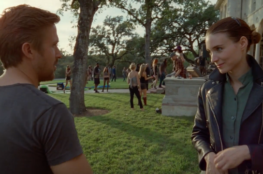I know very little about Sam Kriss, except that he writes a blog entitled Idiot Joy Showland, publishes in Left-leaning outlets, and penned Pater Edmund Waldstein’s favorite reflection on the Charle Hebdo killings in France. People I am friends with in real life and via social media enjoy Kriss, and many more are enjoying his recent piece on Chris Kyle, the slain Navy SEAL whose life—or a certain framing of his life by director Clint Eastwood in the film American Sniper—is causing a tidal wave of controversy. Some of the controversy is quite silly; a good deal of it is trivial and nitpicky; and then there are the heavy-hitting critiques which purport to expose the flaws in both Kyle’s character and Eastwood’s filmmaking talents. For some, such as Kriss, the two are almost intertwined, though perhaps Eastwood shares a bulk of the blame for crafting a movie which portrays Kyle unrealistically while glorifying the Iraq War (and perhaps war in general). For all of Kyle’s faults, including fabricating several outrageous tales in his ghostwritten autobiography, a desperate desire to hide them wasn’t one of them. As Kriss recounts, Kyle bragged remorselessly about the number of people—military and civilian—he killed during his tours in Iraq and his opinion of the Iraqi population as a whole was less-than-edifying. Moreover, Kyle never questioned the Iraq War nor had any qualms about his mission—a mission he frames as protecting American military lives above all else. That facet of Kyle’s character does make its way into Eastwood’s biopic, and it is the least bothersome part of the film.
Whatever moral world Kriss inhabits, it is far removed from martial realities. Whereas Kriss seems to want soldiers existentially wrestling with their missions as their comrades are killed and their objectives falter, the peoples of the earth, at all times and in all places, have no doubt preferred to be protected by armies with a sense of order, duty, and discipline. Certainly the American soldiers stationed in Iraq, regardless of their individual opinions of the war, preferred sniper protection from a dedicated SEAL over a milquetoast fighter plagued by a nasty case of Weltschmerz. That Kyle’s zeal spilled over into his civilian life, perhaps rendering him insensitive to the actual needs of the traumatized soldiers he tried to assist after the war (one of whom kills Kyle at a shooting range), seems to be true; that truth does not undermine the fact that dedication, not despair, is essential to military life.
Kriss, of course, doesn’t have much patience for such things. From London, this 20-something college graduate writes with a godlike posture while trying to draw a sympathetic sketch of Iraqi insurgents as freedom-fighters innocently defending their homes from a hyper-armed foreign power hellbent on death and destruction. The truth of the matter is exponentially more complicated than Kriss seems to realize—an oversight he shares with Eastwood. American Sniper briefly, but effectively, draws an unsettling causal line between the September 11, 2001 attacks and the invasion of Iraq; the former led to the latter. Eastwood’s unambiguous Good Guys v. Bad Guys narrative, divorced from the political machinations that went on behind the scenes and in front of television cameras, is just as nauseating as Kriss’s equivocating.
None of this is to say that the Iraq War was just. Contrary to the hawkish view promoted in the pages of First Things and other conservative Catholic outlets, the Church’s teaching on just war, as informed in no small part by St. Thomas Aquinas, demands three conditions to be met: (1) The war is declared by a lawful or legitimate authority; (2) The war is declared for a just cause; and (3) That the war is being conducted for the right intention, specifically to repair an injustice. It is very difficult, if not impossible, to find that the Iraq War, or perhaps even the engagement in Afghanistan, met these requirements. At the same time, however, those pledged to military service retain their duty to defend their fellow soldiers and themselves, even when pressed into an illicit war.
Returning to Eastwood’s film and stepping away from Kriss’s thoughts, let me say this. For all of its flaws, American Sniper’s second-half does raise some flags of doubt about the war effort as a whole and the psychological impact it has on both Kyle and his fellow soldiers. Kyle is made painfully aware by the film’s end that the war has followed home many of those who served, including him. One might interpret the close of the film, and indeed the final years of Kyle’s life, as an extension of the war itself, one that ended up making Kyle another entry on the long and still expanding list of casualties. Or perhaps American Sniper is just a piece of emptyheaded propaganda and soulless jingoistic nonsense backed up by above-average acting and arresting imagery. How we judge the film likely says more than a few things about how we judge the times in which we live, and many of those judgments are more vacuous than others.


